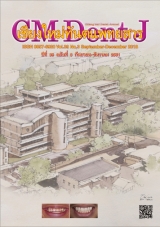Xerostomia: Subjective Meanings and Self Care Experiences in the Perspective of Patients
Main Article Content
Abstract
This study is a descriptive study using the quantitative approach with in-depth interviews to study subjective meanings and self care experiences in the perspective of patients with dry mouth symptom. Ten interviewees with different symptoms of xerostomia were recruited from xerostomia patients in Mae Tha Hospital, Lamphun province. The data was collected between June, 2016 to December, 2016.The average age of cases is over 50 years old, being middle financial and social status.
The study found that annoyance to daily living is the major concern of people with xerostomia. According to patients’meanings, there are five relative aspects of xerostomia; normality, typical symptom related to their pre-existing health conditions, feeling of loss, signs of life threatening disease and indications of the dynamic changes of body and health. It is also indicated that perceptions for dry mouth can be either permanently or temporarily and cause many effects to their physical, mind and social life.
The patients are also seeking treatments that are consistent with their definitions. They also adjusted their behaviors and living conditions to be able to live with dry mouth. Gaining self assessment by trying many methods in self-regulation and manage dry mouth,each person observes him/herself and find out self care’s pattern that’s compatible with his/her own’s life. Each of them therefore integrates many methods to take care themselves in everyday life. Most of them feel that their dry mouth symptom are better and still perform self care behavior as usual. They also try to pay more attention to health.
The findings from this study show that xerostomia or dry mouth symptom is one of oral health problem which relate to whole physical and life of patients. Therefore the healthcare professionals may need to listen and take it more serious in the viewpoints of patients in order to accomplish appropriate advices and health care management.
Article Details
References
MS Hopcraft ,C Tan. Xerostomia: an update for clinicians. Aust Dent J 2010; 55: 238–244.
Han P, Suarez-Durall P, Mulligan R. Dry mouth: A critical topic for older adult patients. J Prosthodont Res 2015; 59: 6 – 19.
Folke S, Fridlund B,Paulsson G.Views of xerostomia among health care professionals: a qualitative study. J Clin Nurs 2008; 18: 791-798.
Thomson W.M, Poulton R, Broadbent JM ,Al-Kubaisy S. Xerostomia and medications among 32-year-olds. Acta Odontol Scand 2006; 64: 249–254.
Hay D.K., Morton R.P. Optimal nocturnal humidification for xerostomia. Head & Neck 2006; 28(9): 792-796.
Thomson W.M, Chalmers JM, Spencer AJ, Slade GD,Carter KD.A longitudinal study of medication exposure and xerostomia among older people .Gerodontology 2006; 23: 205-213.
Bruce S.D. Radiation-induced xerostomia:How dry is your patient?. Clin J Oncol Nurs 2004; 8: 61–67.
Gupta A, Epstein J.B,Sroussi H. Hyposalivation in Elderly Patients. J Can Dent Assoc 2006; 72(9): 841-846.
Villa A, Abati S. Risk factors and symptoms associated with xerostomia:a cross-sectional study. Aust Dent J 2011; 56: 290-295.
Kuthasema P , Putwatana P, Junhavat D. Experience of Xerostomia, Management, and Outcomes in Patients with Head and Neck Cancer post Radiation. Rama Nurs J 2010: 40-53. (in Thai)
Thomson W.M, Lawrence HP, Broadbent JM ,Poulton R.The impact of xerostomia on oral-health-related quality of life among younger adults. Health Qual Life Outcomes 2006; 4: 86.
Narhi TO. Prevalence of subjective feelings of dry mouth in the elderly. J Dent Res 1994; 73: 20–25.
Turner M, Jahangiri L,Ship JA. Hyposalivation, xerostomia and the complete denture : A systematic review. J Am Dent Assoc 2008; (139): 146–150.
Dental Innovation Foundation Under Royal Patronage [URL of homepage on the Internet]. Bangkok. Available from: HYPERLINK “http://www.dent-found.org/newdesign/research/detail?p=8” http://www.dent-found.org/newdesign/research/detail?p=8
Folke S,Paulsson G, Fridlund B, SÖderfeldt B.The subjective meaning of xerostomia—an aggravating misery. Int J Qual Stud Health Well-being 2009; 4: 245-255.


